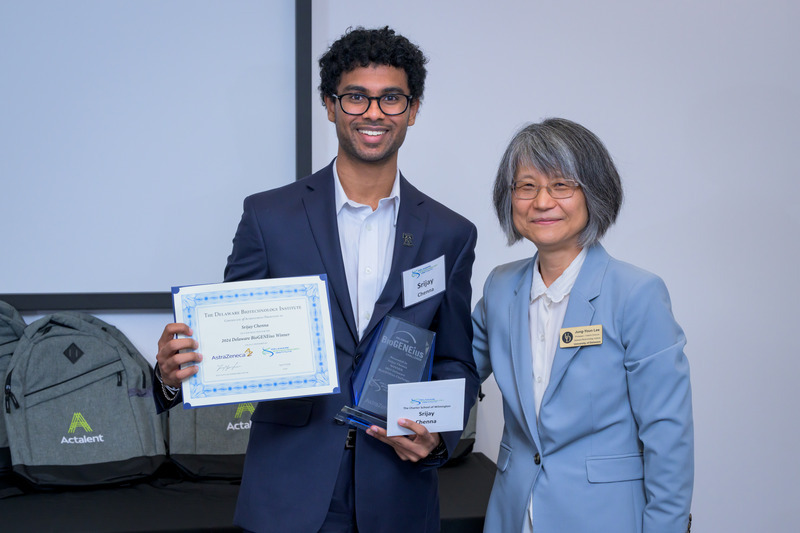


2024 BioGENEius Award winners
Photos by Evan Krape June 17, 2024
High school students honored for biotech ingenuity
From its use in developing gene therapies to degrading plastics, biotechnology is playing an increasing role in our lives.
In Delaware, high school students are contributing their ingenuity to this growing field through the Delaware BioGENEius Challenge, an annual science competition for students in grades 9-12.
Hosted by the Delaware Biotechnology Institute (DBI), a statewide research center based at the University of Delaware, the challenge lives up to its name by engaging students in research that harnesses living cells or their processes in some way, whether as “protein factories” for making medicines, for example, or as natural antibacterial agents, such as those found in orange peel.
“These exceptional students exemplify the spirit of scientific inquiry and innovation, tackling pressing issues in diverse areas of biotechnology,” said UD Professor Jung-Youn Lee, interim director of DBI at the awards ceremony, held April 25, in the Ammon Pinizzotto Biopharmaceutical Innovation Center on UD’s Science, Technology and Advanced Research (STAR) Campus.
“Their projects underscore the importance of STEM education in fostering critical thinking, problem-solving skills and a passion for discovery,” Lee said. “We celebrate them all.”

2024 Delaware BioGENEius Challenge Winners
Winner and State Finalist: Srijay Chenna, Charter School of Wilmington
When the coronavirus pandemic hit, Srijay Chenna said that, unlike most people, he suddenly found himself connected to a whole new world — a science community eager to learn more about messenger RNA (mRNA), the technology used to rapidly make vaccines to combat COVID-19. In his award-winning project, Chenna focused on using dendritic nanoparticles, shaped like tiny branching trees, as a mechanism for encapsulating and delivering mRNA to targeted cells.
“Srijay’s groundbreaking project addresses a crucial aspect of future mRNA therapeutics,” said Camille Sims-Johnson, assistant director of outreach and communications at DBI. “His dedication to enhancing the synthesis process showcases his commitment to advancing medical science for the benefit of humanity.”
As Delaware’s state finalist, Chenna advances to the U.S. National BioGENEius Challenge, which will be held this October in New York City at CURE, a cutting-edge biosciences campus in the heart of Manhattan.
Environment Category
First Place: Subiksha Srinivasan Vidya, Charter School of Wilmington
How will a warming planet affect the soil beneath our feet? It matters far more than you may think, according to Subiksha Srinivasan Vidya.
Steadily increasing carbon dioxide (CO2) emissions raise global temperatures and disrupt ecosystems including soil, a crucial habitat for billions of organisms, Vidya said.
“The rising temperatures prompt soil microbes to increase respiration activities, releasing more CO2 and exacerbating the problem,” she said. “This results in a catastrophic cycle, and attempting to prevent this cycle is critical.”
From the scientific literature, she learned about the potential application of a gene known as carbonic anhydrase, found in bacteria and other living organisms, as a “biological carbon-capturing system” and researched the possibility of overexpressing different enzymes in the soil bacterium Bacillus subtilis PY79 to enable more carbon capture.
Sophia DiGenova, Charter School of Wilmington, received second place in the category for her project, “Inhibitory Potential of Limonene on Bacterial Growth.”
Health Care Category
First Place: Alice Yan, Charter School of Wilmington
Alice Yan’s research was inspired by doctors and nurses, flight attendants and truck drivers.
“Sometimes they must be active at night and stay awake for a day or more at a time,” Yan said. “These abnormal schedules can drastically affect these individuals' circadian rhythm.”
Circadian rhythm is the internal clock that instructs the body to carry out functions based on the time of day. Disruptions to this internal tuning to daily cycles of day and night have been linked to worsening heart and brain function, among other health conditions.
By examining circadian rhythm in rats, which, biologically, are similar to humans, Yan said she hopes to gain more insight into possible solutions to ailments linked to irregular sleep schedules.
Yiru Wang, from St. Andrew’s School in Middletown, received second place in the category for his project, "Pneumatic Exoskeleton for Knee Flexion and Extension Facilitation During Rehabilitation: A Lightweight, Personalized, Multi-functional Rehabilitation Device."
Agriculture Category
First Place: Morgan Lowe, Sussex Technical High School
Interning as a research assistant at UD’s Carvel Research Center, Morgan Lowe learned about challenges facing poultry farmers in the region, including controlling the population of darkling beetles (Alphitobius diaperinus), a common pest in poultry houses.
“These beetles transmit a variety of diseases and bacteria, causing harm to the flocks and potential financial loss to the poultry operations,” Lowe said.
She said her internship inspired her to explore alternate methods of pesticide applications in hopes of improving the control of these pests, and in turn, reduce the amount of time and product loss for poultry farmers.
Cindy Tran from the Charter School of Wilmington, won second place in the category for her project, "The Effects of Acidity and Salinity on the Germination of the Mung Bean Plant."
For more information about the Delaware BioGENEius Challenge, please visit this web page.
About the Delaware Biotechnology Institute
A magnet for life science research and development, DBI supports multidisciplinary, collaborative academic research across Delaware, including at the University of Delaware, Delaware State University, ChristianaCare Health System, Nemours Children’s Hospital, Delaware, and Delaware Technical and Community College. DBI fosters academic-industrial research partnerships, works to support the local bioscience industry in partnership with the Delaware Bioscience Association, and is committed to inspiring the next generation of scientists and the professional development of their teachers through exemplary education and outreach programs.
Contact Us
Have a UDaily story idea?
Contact us at ocm@udel.edu
Members of the press
Contact us at 302-831-NEWS or visit the Media Relations website

